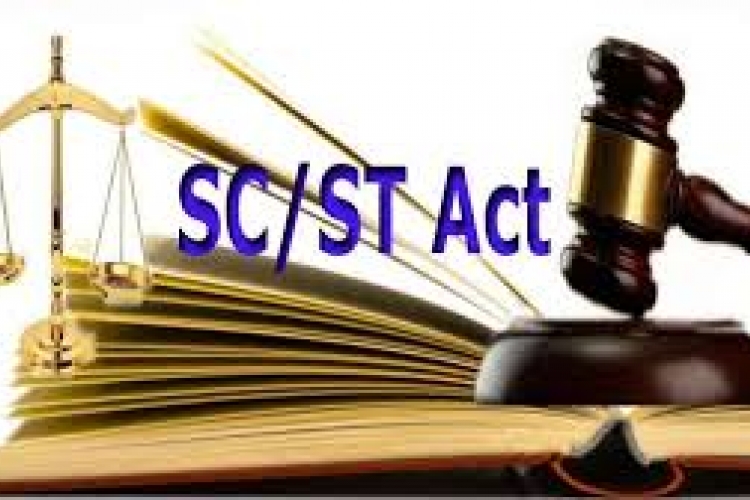Cabinet clears Bill to restore the provisions of SC/ST Act
What is the act?
The SC/ST Act was originally passed in 1955 by Parliament as the Untouchability (Offences) Act. It was renamed as the Protection of Civil Rights (PCR) Act in 1976. The law was considered ineffective in 1980s and replaced with the Scheduled Caste and Scheduled Tribes (Prevention of Atrocities) Act in 1989.The Act prohibits the commission of offences against members of the Scheduled Castes and Scheduled Tribes (SCs and STs) and establishes special courts for the trial of such offences and the rehabilitation of victims.
Why Supreme Court intervened?
The genesis of the Supreme Court ruling lay in a case filed by Bhaskar Karbhari Gaikwad, the storekeeper at the Government College of Pharmacy, Karad in Satara district of Maharashtra. The case related to remarks made in the annual confidential report of Gaikwad by his superiors Satish Bhise and Kishor Burade.
Bhise and Burade wrote that Gaikwad was inefficient in work and his conduct was not proper. While Gaikwad belongs to one of the Scheduled Castes, his supervisors, who made the comments, were not from the same category.
Gaikwad lodged a case in 2006 against Bhise and Burade under the SC/ST Act charging them of making the comments because of his caste and not performance at work. Ten years later, Gaikwad lodged another FIR naming some other officials who apparently did not take action on his first complaint.
Among those named in the second FIR was Subhash Kashinath Mahajan, the Maharashtra director of technical education. He approached the Bombay High Court seeking quashing of the complaint against him in the matter related to adverse entry in the annual confidential report of Gaikwad.
What did Supreme Court rule?
The Bombay High Court quashed the plea following which Mahajan approached the Supreme Court, which gave its ruling on March 20 this year. Here is what the Supreme Court ruling said:
- If a complaint is registered against a person under SC/ST Act, the preliminary enquiry should be completed within seven days.
- The Supreme Court further held that pending preliminary enquiry, it is not mandatory to arrest the accused under the SC/ST Act despite lodging of an FIR in the matter.
- If the accused is a government servant, it is mandatory for the police, the Supreme Court said, to seek permission from higher authorities/recruiting authority for the arrest of the person in cases filed under the SC/ST Act. If the accused is not a government official, the Supreme Court ruled, permission from SSP is mandatory for making arrest in the case registered under the SC/ST Act.
- The Supreme Court further allowed anticipatory bail in cases registered under the SC/ST Act. It ruled that if the court hearing the matter finds prima facie that there is no case or finds that the complaint could be malafide in nature, anticipatory bail may be granted to the accused. However, according to Section 18 of the original SC/ST Act, anticipatory bail cannot be granted in cases lodged under the SC/ST Act.
- The apex court made certain terse remarks while overruling the Bombay High Court judgment. It said that the SC/ST Act was not legislated to perpetuate the caste system. This may impede the process of bringing together all the communities and keeping the constitutional values, it stated.
- The Supreme Court also said that Parliament did not intend to make the SC/ST Act as a tool of blackmail or vengeance. Its aim was not to prevent the government officials from dispensing their duties in fair manner.
- The government officials who had been named in the FIR had argued that if cases were allowed to be registered on the basis of the remarks made in the annual confidential reports under the SC/ST Act, it would become impossible for them to appropriately appraise subordinate staff belonging to the community.
- The Supreme Court referred to NCRB data of 2015 which said that of all the cases registered under SC/ST Act, 15-16 per cent matters were closed after preliminary enquiry. The probes apparently did not find enough evidence to proceed further. In around 75 per cent of the cases that reached the courts, the accused were either acquitted for lack of evidence or cases were withdrawn or dismissed.
- It was amended in 2015 to make it more stringent. Now actions like tonsuring of head, moustache or any other act by dominant castes to challenge the dignity of people belonging to SC/ST communities were made offence.
Restoration of the original act
So the centre introduced a bill to restore the original provisions of SC/ST act1989,which the supreme court struck down. And in the amendment bill it also introduces 3 new clauses after section 18 of the original act. They were
1. Preliminary enquiry shall not be required for the registration of a FIR against any person.
2. Arrest of a person accused of having committed the offence under the act would not require any approval
3.The provisions of the section 438 of the CrPc[which deals with anticipatory bill ] shall not apply to this case.


 "UPSC-2026-PRELIMS COMBINED MAINS FOUNDATION PROGRAMME" STARTS WITH ORIENTATION ON FEB-10
"UPSC-2026-PRELIMS COMBINED MAINS FOUNDATION PROGRAMME" STARTS WITH ORIENTATION ON FEB-10